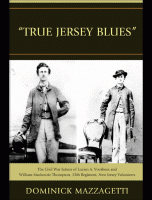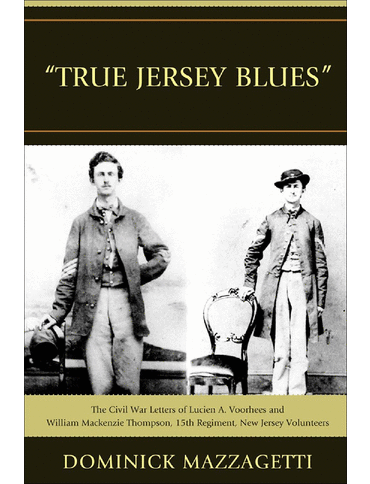 Author: Dominick Mazzagetti
Author: Dominick Mazzagetti
Publisher: Farleigh Dickinson University Press – 253 pages
Book Review by: Paiso Jamakar
This book is a historical account of the participation of the 15th Regiment of New Jersey Volunteers in the Civil War, based on 101 letters written for Hunterdon County newspapers in a period of 18 months from September 1862 to April 1864 by two men among those who dedicated themselves to the cause of the Union: Lucien A. Voorhees and William M. Thompson.
The author Dominick Mazzagetti, who is currently president of RomAsia Bank in Monmouth County, New Jersey, has a background in banking and law, and is also a history buff. He wrote a column for five years for the weekly Hunterdon County Democrat, relating stories of people who lived in the earliest settlements that were built there in that county of the state.
The author’s research efforts of finding interesting topics to write about for his weekly column relating to Hunterdon residents led him, luckily, to chance upon the letters of Voorhees and Thomson presented in this book, found in the microfilm machines at the library of the Hunterdon County Historical Society.
In the letters, the two gentlemen write about their views on the ongoing Civil War in the 1860s, their reasons for fighting in it, and details of the actions they were engaged in on a daily basis, both in and out of the battlefront.
This book, with its numerous letters by these two men, is a rare look at history itself in the making! Reading the letters by participants in that early war is like living it. But more than that, it is not just narrations of events, but personal emotions revealed by these men as they were involved in that war on a daily basis.
For example, Mazzagetti reproduces at the outset of his book in Excerpt from a Letter, William Mackenzie Thompson’s deeply moving thoughts that bought tears in my eyes as I was reading it. Thompson, in his letter dated November 21, 1863, writes about that rainy day and characterizes the rain he sees as “tears” of Nature, and ruminates on the ongoing fight of men against their fellowmen, and the senseless killing.
“Then Nature must love the earth deeply, judging by the tears she showers and pours upon it. During the week the weather has been delightful – so warm it seemed like Indian Summer, and at sunset the sky would appear like a great Union banner, with its lines of red and white; and as evening advanced the stars would glitter in the firmament – everything so clear and beautiful one could scarcely imagine that beneath that heaven human beings were gathered, waging war against each other.”
Describing the beautiful scenery he sees that depicts harmony and peace, Thompson asks, as if almost in anger and frustration: “why could not man, endowed with reason, formed in the image of his Maker, in a nation the most civilized in art and science, live in harmony with each other? Reason has sunk to sleep, and Passion runs into riot; Ambition – false it is – has taken men captive; Slavery, with all its train of curses, has become the idol before which men bow down and worship.”
The author provides historical perspective, background knowledge and commentary before, after and throughout the presentation of these letters by Voorhees and Thompson.
The letters are not laid out chronologically as one might expect. Rather they are organized by subject in the 10 chapters of this unique historical account of the Civil War.
The readers’ sense of being there and visualizing the scenes make this makes this book a very valuable and useful one. Here below for example, is a letter on the sheer harshness of fighting and the most devastating consequence of war – death – in chapter 2, Life in Camp. It was written by Lucien A. Voorhees on March 14, 1863:
“Frequent deaths in the Regiment, as usual, form the principal theme of conversation. Why it is I cannot tell, but it is a sad reality that our patriotic associates are rapidly passing to another scene of action. You go to the hospital, and there, pale and emaciated, are living skeletons, on the brink of eternity – Diarrhea, Dysentery and Fevers are the most usual diseases prevalent in camp…..would to God, that something could be done for this dying Regiment.”
In summary, with this book, Dominick Mazzagetti has made a unique and significant contribution to U.S. history by researching, compiling, organizing and expertly presenting the material found in this very different type of history book. Our congratulations go to him for this one-of-a-kind achievement.







